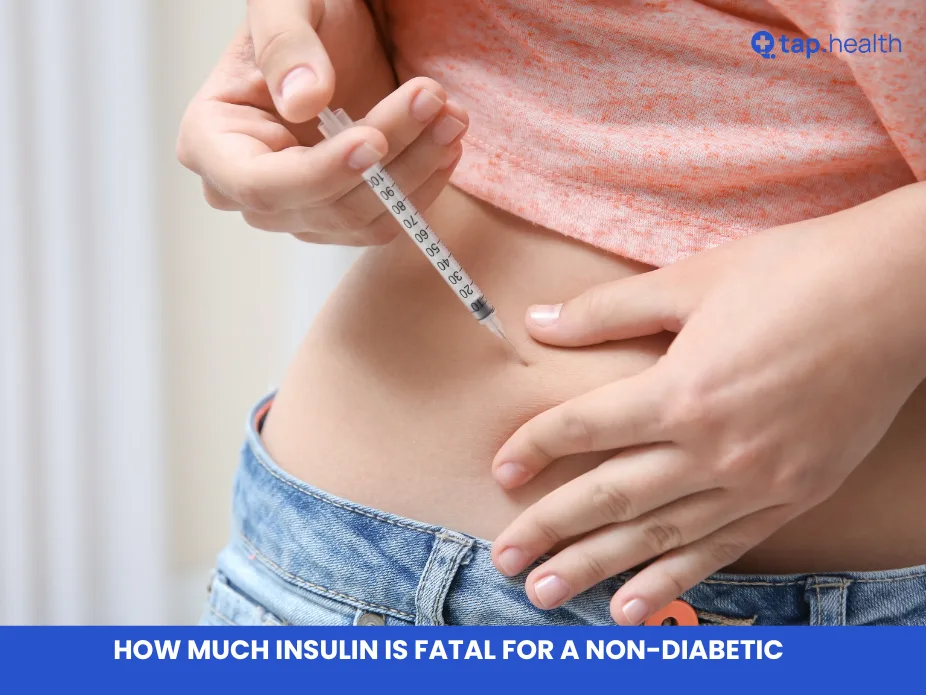Insulin is a hormone that plays a vital role in regulating blood sugar levels in the body. It’s produced by the pancreas and helps cells absorb glucose from the bloodstream. People with diabetes often rely on insulin injections to manage their blood sugar levels. However, when insulin is used incorrectly or taken by a person without diabetes, it can be dangerous, even life-threatening. In this guide, we’ll explore how much insulin can be fatal for a non-diabetic, the risks of insulin overdose, symptoms to watch out for, and what to do in case of an emergency.
What Is Insulin and Why Is It Important?
Before diving into the risks of insulin overdose, it’s important to understand what insulin is and how it works. Insulin is a hormone produced by the pancreas, and its primary function is to help cells absorb glucose from the bloodstream. The cells use this glucose for energy. People with diabetes either don’t produce enough insulin or their bodies don’t respond to it effectively, so they need to take insulin injections to keep their blood sugar levels in check.
For non-diabetics, insulin plays an important role in maintaining normal blood sugar levels. However, too much insulin can cause the body’s blood sugar to drop dangerously low, leading to hypoglycemia. Hypoglycemia can be fatal if not treated promptly.
How Much Insulin Is Fatal for a Non-Diabetic?
When considering how much insulin might be fatal to a non-diabetic person, it’s important to note that it varies from person to person. Factors such as weight, overall health, and tolerance to insulin can all influence how much insulin would cause a life-threatening reaction.
Common Dosage of Insulin
For diabetics, the typical insulin dosage varies. On average, a non-diabetic person would need an unusually high dose to experience life-threatening consequences. However, the amount is still not well-defined due to individual differences. A range of 10 to 20 units of insulin may cause severe hypoglycemia, but in some cases, even smaller amounts can cause significant drops in blood sugar, especially if the person is not accustomed to it.
In general, non-diabetics are not accustomed to the effects of insulin, and the body’s insulin receptors are not sensitized to process insulin effectively. Therefore, even doses lower than 10 units may cause severe hypoglycemia in some individuals.
How Insulin Affects a Non-Diabetic Person
In a non-diabetic person, taking insulin can lead to dangerous drops in blood sugar, also known as hypoglycemia. Insulin forces the body’s cells to absorb glucose from the bloodstream, which can result in a dangerously low blood sugar level.
When blood sugar levels drop below 70 mg/dL, a person can begin to experience symptoms of hypoglycemia. At lower levels, the situation becomes even more dangerous, as the brain depends on glucose for energy, and low levels can cause confusion, seizures, and loss of consciousness. In severe cases, if the blood sugar level falls below 20 mg/dL, it can lead to coma or death.
What Happens During an Insulin Overdose?
When a non-diabetic takes an overdose of insulin, their blood sugar level drops dramatically. This condition is known as hypoglycemia and can lead to several symptoms:
Symptoms of Hypoglycemia
- Shaking and Tremors – One of the first signs of hypoglycemia is shaking or trembling, as the body tries to compensate for low blood sugar.
- Sweating – Increased sweating occurs as the body struggles to maintain normal blood sugar levels.
- Confusion or Dizziness – Low blood sugar affects brain function, which can cause confusion or a feeling of dizziness.
- Weakness or Fatigue – Insulin overdose can cause extreme fatigue or weakness, making it difficult to perform daily activities.
- Blurred Vision – Insulin overdose can affect the eyes, causing blurred or double vision.
- Loss of Coordination – As blood sugar continues to drop, it can cause a lack of coordination, which may make it difficult for the person to walk or stand.
- Severe Symptoms – If left untreated, hypoglycemia can lead to seizures, unconsciousness, and even death.
How Insulin Overdose Affects the Body
When the body experiences an insulin overdose, the cells take in too much glucose from the blood, leaving the blood sugar levels dangerously low. This leads to:
- Reduced Brain Function: The brain requires glucose to function properly, and a drop in glucose levels can cause confusion, difficulty concentrating, and, in extreme cases, seizures or coma.
- Increased Heart Rate and Blood Pressure: The body may react to the low blood sugar levels by increasing the heart rate and blood pressure in an attempt to get more glucose into the bloodstream.
- Severe Hypoglycemia: If untreated, severe hypoglycemia can cause unconsciousness or even death.
Can Insulin Be Used as a Suicide Method?
In some cases, individuals may take an overdose of insulin with the intent to harm themselves. Since insulin overdose causes hypoglycemia, which leads to brain dysfunction, it is a dangerous and potentially fatal method.
It’s essential to understand that insulin overdose is not an effective or reliable method of suicide, and anyone feeling suicidal should seek help immediately from a healthcare professional, therapist, or suicide prevention hotline.
Treatment for Insulin Overdose in Non-Diabetics
If a non-diabetic person takes too much insulin, it’s important to seek medical attention immediately. The treatment for insulin overdose typically involves restoring the blood sugar levels as quickly as possible. Here’s what you can expect:
Initial Treatment Steps
- Glucose Administration: The first step in treating hypoglycemia is to give the person a fast-acting source of glucose. This could be in the form of glucose tablets, sugary drinks, or even a glucose gel.
- Intravenous Glucose: If the person is unconscious or unable to swallow, medical professionals may administer intravenous glucose to raise the blood sugar levels rapidly.
- Monitoring: After glucose is administered, the person will be closely monitored to ensure that their blood sugar levels stabilize and that no further complications arise.
- Emergency Medical Attention: In severe cases, hospitalization may be necessary, and doctors may administer other medications or treatments to stabilize the person’s condition.
Preventing Insulin Overdose
If you are not diabetic, it’s essential to avoid insulin injections entirely. Here are some preventative measures:
- Don’t Experiment with Insulin: Insulin should never be used by anyone who is not diabetic, as the risks of overdose are too high.
- Keep Insulin Out of Reach: If you live with a diabetic person, make sure that insulin is stored safely away from children and non-diabetic individuals.
- Understand the Risks: It’s important to understand the risks of insulin use and the signs of overdose. This knowledge can be helpful in case of an emergency.
Real-Life Scenarios
Ramesh’s Close Call
Ramesh, a 25-year-old student in Mumbai, accidentally injected his roommate’s insulin pen, mistaking it for a regular medication. Within minutes, he felt dizzy and confused. Fortunately, his roommate acted quickly, giving him sugary drinks until emergency help arrived.
“That day taught me how dangerous insulin can be if misused. I’m so grateful my friend knew what to do,” Ramesh recalls.
Priya’s Medical Mishap
Priya, a 40-year-old homemaker from Jaipur, was mistakenly given insulin during a routine hospital visit. She experienced severe hypoglycemia but recovered after receiving intravenous glucose.
“Even in a controlled environment, errors can happen. Now I double-check everything before treatment,” Priya says.
Expert Contributions
Dr. Anil Sharma, an endocrinologist in Delhi, explains:
“Insulin is a powerful hormone that should never be used without medical supervision. For non-diabetics, even small amounts can cause life-threatening hypoglycemia. Education and caution are key to preventing misuse.”
For more insights on diabetes and diet-related concerns, read: Can a Diabetic Have Pancakes?.
Recommendations Grounded in Proven Research and Facts
1. Keep Insulin Secure
If you live with someone who uses insulin, ensure it’s stored in a secure place, out of reach of children or others who might use it accidentally.
2. Recognize the Symptoms of Hypoglycemia
Be aware of the signs of low blood sugar, including:
- Shakiness
- Sweating
- Confusion
- Fatigue
If someone appears unwell and you suspect insulin misuse, act quickly.
3. Always Seek Medical Help
In cases of insulin overdose, call emergency services immediately. While waiting for help, provide fast-acting sugar (like juice or candy) if the person is conscious.
4. Educate Yourself and Others
Understanding how insulin works can prevent misuse. If you live with someone who uses insulin, learn about their treatment plan and what to do in an emergency.
5. Avoid Misuse or Experimentation
Never use insulin unless prescribed by a doctor. Misusing insulin as part of a weight-loss strategy or other purpose can have devastating consequences.
Insulin Safety Explained: How Tap Health Helps You Understand the Risks
Tap Health empowers you with the knowledge and tools to use insulin and other medications safely:
- Medication education: Learn how insulin works and the right way to manage it if prescribed.
- AI-driven insights: Get reminders for doses and alerts for unusual glucose patterns.
- Emergency readiness: Understand early warning signs of hypoglycemia and what to do.
- Personalized health tracking: Monitor your glucose, meals, and activity to keep insulin needs in balance.
Tap Health helps ensure that your treatment stays safe, informed, and personalized, reducing the risk of insulin misuse or dangerous blood sugar fluctuations.
FAQs on How Much Insulin is Fatal for a Non-Diabetic?
1. How much insulin is dangerous for a non-diabetic?
An insulin dose of 10 to 20 units can cause severe hypoglycemia in non-diabetics, though the exact amount varies depending on the person’s weight, health, and insulin sensitivity. Even smaller doses may cause significant drops in blood sugar.
2. Can a non-diabetic person overdose on insulin?
Yes, a non-diabetic person can overdose on insulin. Since their body is not used to processing insulin, even small doses can lead to dangerous drops in blood sugar levels, leading to hypoglycemia.
3. What should I do if I suspect an insulin overdose?
If you suspect an insulin overdose in a non-diabetic person, seek emergency medical help immediately. In the meantime, administer glucose if the person is conscious and able to swallow.
4. Can a non-diabetic person die from an insulin overdose?
Yes, insulin overdose can lead to life-threatening hypoglycemia, and if left untreated, it can cause seizures, coma, and even death.
5. How can I prevent an insulin overdose?
The best way to prevent an insulin overdose is to avoid using insulin if you are not diabetic. If you live with a diabetic person, store insulin securely and ensure it is not accessible to anyone who does not need it.
In conclusion, insulin is an essential hormone for people with diabetes, but it can be extremely dangerous for non-diabetics. Even small amounts of insulin can cause severe hypoglycemia, which can be fatal if not treated promptly. If you ever find yourself in a situation involving insulin overdose, seeking immediate medical attention is critical to prevent life-threatening complications. Always handle insulin with care, and never use it unless prescribed by a doctor.



